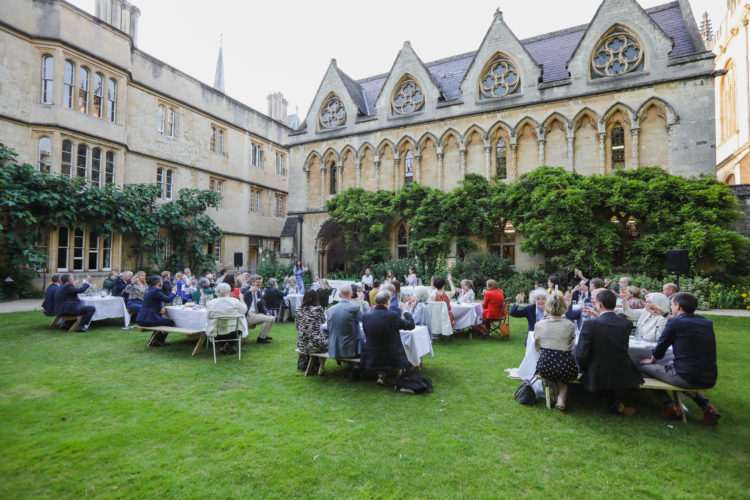Rector Trainor reviews events of the Long Vacation 2021
The Long Vacation saw Exeter approaching something like its normal routine even more than had been possible in Trinity Term.
Indicative of this trend was the reopening of the College’s doors to tourists, including the availability both of bed-and-breakfast and the especially popular cream teas in Hall. The Oxford ‘Open Doors’ event, cancelled last year, proved more popular than ever, with 2,500 people visiting Exeter’s stunning grounds at Turl Street in a single day. Also significant was the resumption of the holding of weddings in the College Chapel. The digital running of the Exeter College Summer Programme (ECSP) – which could not be held at all in 2020 – was, in the context of having had to recruit students when pandemic infection levels were still relatively high, even more remarkable.
By far the most spectacular single aspect of the return to in-person events was the celebration held in the Fellows’ Garden in mid-July to celebrate the publication of Vaxxers, co-authored by Exeter Senior Research Fellow Professor Cath Green (biomedical sciences) OBE and Professor Dame Sarah Gilbert. Social distancing was still in force, but the delightful summer evening meant that a festive spirit prevailed. In addition to remarks from Cath and Sarah, the speeches included a contribution from Neil Blair (1986, Jurisprudence), who promoted the best-selling book. Later in the summer came the news that these two leaders of the Oxford vaccine team had won GQ’s award for Heroes of the Year! Further popular acclaim followed, with the announcement of a Sarah Gilbert Barbie doll (!) and a rumour of Hollywood interest in a film of the making of the Oxford Astra Zeneca vaccine. What shone through, at the Exeter occasion, was the vast positive impact of the vaccine, which I consider to be one of the most important discoveries ever to come out of Oxford or any other university.

Vaxxers Launch Celebration in Exeter’s Fellows’ Garden
Other notable achievements for Exeter Fellows during the Long Vacation included: the election of Emeritus Fellow (and long-time Classics Tutor) Gregory Hutchinson, now Regius Professor of Greek, to the British Academy; the Honorary Doctorate of Informatics awarded to Professor Luciano Floridi (Philosophy and Ethics of Information) by Sweden’s University of Skovde; and the Fellowship of the Royal Historical Society for Professor Christina de Bellaigue (History). Also significant was the publication, by Emeritus Fellow Helen Watanabe O’Kelly (German), of Projecting Imperial Power: New Nineteenth Century Emperors and the Public Sphere (Oxford University Press). Meanwhile, Professor Nandini Das (English) appeared in a three-part BBC series on the Boleyn family; she also played a leading role in the free online cultural festival mounted by her TIDE (Travel, Transculturality and Identity in England, 1550-1700) Project. Another important Exeter-related achievement was the MBE awarded to Professor Guy Thwaites (Infectious Diseases), Director of the Oxford University Clinical Research Unit, for services to public health and UK/Vietnam relations: he will take up a Supernumerary Fellowship of Exeter in January 2022. I also note that Professor Christine Gerrard (English), one of Exeter’s first women Fellows, is serving as Interim Principal of Lady Margaret Hall during academic year 2021/22.
Exeter’s students, too, had a high-achieving summer. The student-run charity ExVac was able to run, for the first time since the onset of the pandemic, a holiday programme for local children who otherwise have no access to such breaks. Meanwhile, the College Choir toured English cathedrals, completed the recording for a new CD, and (supported by Exeter’s Alumni Choir) sang at a very well attended Evensong in early September. Academic accomplishments were also numerous. In addition to nearly three dozen Firsts, Exeter students won a series of University prizes, including the award for the best overall performance in Law Finals.

The ExVac Summer Programme was able to go ahead for the first time since 2019
In mid-September some Exeter alumni who came up between 1970 and 1974 attended an enthusiastic Gaudy, the first held since Covid-19 hit; the alumnus speech was provided by Peter Mann (1971, English), who had come all the way from Hong Kong for the occasion. During the following week a number of distinguished Exeter women alumni attended a special Encaenia at which all the honorary graduands were female; this event, postponed from 2020 by the pandemic, belatedly marked the hundredth anniversary of the all-too-recent first awarding of Oxford degrees to women. The recipients this year included Hillary Clinton, who joined other honorands at the pre-ceremony party (‘Lord Crewe’s Benefaction’) held, as usual, in Exeter’s Fellows’ Garden. That was exciting, but the most spectacular recent event relating to Exeter was the dedication in Westminster Abbey’s Scientists’ Corner, on 28 September, of a memorial tablet to Sir Roger Bannister (1946, Physiological Sciences). At the luncheon which followed, the grace used (by Sir Roger’s daughter, former Exeter College Catechist Charlotte Bannister-Parker) was Exeter’s, and speeches were given by Sir Roger’s sons, Clive (1977, PPE) and Thurstan (1979, PPE) Bannister, and by his widow Lady Moyra, a frequent and much-loved visitor to the College.
Among other Long Vacation events of special significance for Exeter were the approval in July by the Privy Council of the College’s new Statutes (which come into effect on 10 October) and the shortlisting of Cohen Quad for three pending Education Estates Awards. Also, three new Fellows – Dr Edith Chen (History), Dr Sarah Howles (Medical Research), and Dr Agni Orfanoudaki (Management) – will soon be inducted into their Fellowships.

Welcoming three new Fellows, Dr Sarah Howles (Medical Research), Dr Agni Orfanoudaki (Management) and Dr Edith Chen (History)
Exeter made further progress in its quest for an ever more diverse student body when undergraduate admissions offers were confirmed in August. Ongoing recent access efforts included the September Open Day. That was online this year, as was the renewed College programme for state school pupils from East Lothian. Very much in person, however, has been the third annual ‘Exeter Plus’ ‘bridging’ programme; this academic year it will also include in-term support. Because of the lingering effects of the pandemic even greater care than usual is being taken this year with the full range of orientation programmes. This October the latter include special ‘reorientation’ sessions for rising second-year undergraduates, many of whom were away from Oxford for much of their first year due to Covid-19.
While making contingency plans in case progress in controlling the pandemic stalls, Exeter – like the rest of the University – hopes to hold much in-person tutorial teaching in Michaelmas Term. Social as well as academic preparations have been made for the new academic year. Reviving a tradition, the College staged a well-attended mid-September party in the Fellows’ Garden for staff and Fellows.
Finally, please do pay careful attention to the information, recently despatched by the College, about the special appeal to raise funds for the restoration and renovation of the College Library in Turl Street. This urgent project will enhance the heart of the College’s academic endeavours. The work, scheduled for the academic year 2022/23, will restore Gilbert Scott’s masterpiece to its Victorian splendour while creating study spaces fitting the needs of Exeter’s 21st-century students.
Marguerite and I hope that you all had a good summer – as we did, escaping for a time to the States, fortified by passports, vaccination certificates, and PCR test results – and are having a good early autumn.
Rick Trainor
Rector
